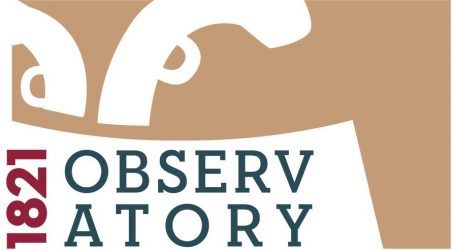The Greek Revolution and the Age of Revolution
Perhaps one of the most debated issues of the bicentenary of the 1821 Revolution, both academically and in public history, was that of its transnational dimension and its connection to the so-called Age of Revolution. The term “Age of Revolution” was coined in the literature in 1962 by the famous historian Eric Hobsbawm,[1] who highlighted the transformative significance of the French and Industrial revolutions for Europe from 1789 to 1848, as they resulted in the dissolution of the ancien régime and the emergence of the modern bourgeoisie.
But how is the Age of Revolution connected to the Greek Revolution? On the one hand, one point of contact was between the modern philosophy of the European Enlightenment and the great thinkers of the Modern Greek Enlightenment, such as Rigas Feraios and Adamantios Korais, who laid the ideological groundwork for the 1821 Revolution. Several academic events, such as lectures and conferences, were dedicated to this aspect of the ideological preparation of the struggle. For example, in the series of lectures “21 Lectures on 1821”, hosted by the National and Kapodistrian University of Athens to mark the bicentenary of the revolution, historian and political scientist Paschalis Kitromilides analysed this issue.[2]
In addition, the issue of the connection of the Modern Greek Enlightenment with the modern ideas of the French Revolution was the subject of an event co-hosted by the Netherlands Institute at Athens and the Research Center for Greek Philosophy of the Academy of Athens. More specifically, in the first session of the event, Georgios Kalpadakis, a researcher at the Academy of Athens, analysed the influence of the Enlightenment on the work of both Rigas Feraios before the revolution and of Ioannis Kapodistrias after it.[3] Also, in other talks in the series, Yanna Tzourmana explained that constitutionalism, as a phenomenon linked to the Age of Revolution starting with the French and American examples, influenced the revolutionaries of the Global South,[4] while Annelien de Dijn, professor at the University of Utrecht, linked the political thought of the French Revolution with the Greek one.[5]
A second way in which the Greek Revolution is connected to the international wave of revolutions is through the Philiki Etaireia, which not only had an international scope but operated on the basis of other conspiratorial societies, such as the Freemasons. Another lecture from the aforementioned “21 Lectures on 1821” series was dedicated to these aspects of the Philiki Etaireia, with Nassia Yakovaki, assistant professor of the University of Athens, as the keynote speaker, who analysed the seven-year course of the secret society.[6] A similar lecture was given in the context of the University of Cyprus lecture series “1821–2021: 200 Years since the Greek Revolution”, where Panagiotis Michailaris (National Hellenic Research Foundation),[7] Dimitris M. Kontogeorgis (University of Cyprus)[8] and Julia Chatzipanagioti-Sangmeister (University of Cyprus)[9] talked about the establishment of the Philiki Etaireia, its Balkan dimensions and its connection with Freemasonry.
Finally, the participation of foreign volunteers in the Greek Revolution – in many cases liberals who participated in other revolutions – marks another form of the connection of the Greek struggle for national independence with the Age of Revolution. Aristides Hatzis, professor at the University of Athens, and Anna Karakatsouli, associate professor at the University of Athens, discussed this issue extensively in the Centre for Liberal Studies (KEFiM) series “Bicentenary of the Liberal Revolution”.[10] In addition, this topic was the subject of an international conference organised by the University of Athens entitled “The Greek Revolution in the Age of Revolutions (1776–1848): Reappraisals and Comparisons”, which was attended by 20 speakers from around the world. The conference proceedings were published by Routledge.[11]
Konstantina Tortomani, Postdoc researcher in modern and contemporary European history at the Department of History and Ethnology, Democritus University of Thrace
[1] Eric Hobsbawm, The Age of Revolution: Europe: 1789–1848 (London: Weidenfeld, 1962).
[2] Paschalis Kitromilides, “Διαφωτισμός και Ελληνική Επανάσταση” [Enlightenment and the Greek Revolution], 27 January 2021, https://youtu.be/6R145fLey0M.
[3] George Kalpadakis, “Enlightenment Visions of the Post-Ottoman Balkans: Rhigas and Kapodistrias,” 10 May 2021, https://youtu.be/zR3zri0H5wc.
[4] Yanna Tzourmana, “Constitutionalism and Reform Politics in the Age of Revolutions,” 10 May 2021, https://youtu.be/1Uiw5p_mZTE.
[5] Annelien de Dijn, “Key Aspects of French Political Thought as a Link between the Greek War of Independence and the French Revolution,” 10 May 2021, https://youtu.be/icQwBxsKMkw.
[6] Nassia Yakovaki, “Η Φιλική Εταιρεία και η έκρηξη της Ελληνικής Επανάστασης” [The Philiki Etaireia and the Outbreak of the Greek Revolution], 3 March 2021, https://youtu.be/CFO-2-OlWa4.
[7] Panagiotis Michailaris, “Φιλική Εταιρεία: από την ίδρυση της Οδησσού (1814), στην έκρηξη του Μοριά (1821)” [Philiki Etaireia: from the founding at Odessa (1814), to the eruption in the Peloponnese (1821)], 17 March 2021, https://youtu.be/tBxuCVuZAdI?t=1655.
[8] Dimitris M. Kontogeorgis, “Η Φιλική Εταιρεία και οι Βαλκανικοί λαοί. Σχέδια, επιτεύγματα και αποτυχίες” [Philiki Etaireia and the Balkan peoples: Plans, achievements and failures], in 17 March 2021, https://youtu.be/tBxuCVuZAdI?t=57.
[9] Julia Chatzipanagioti-Sangmeister, “Ο τεκτονισμός και η Ελληνική Επανάσταση του 1821: αστική δημοσιότητα, κοινωνικές ιδέες, επαναστατική δράση” [Freemasonry and the 1821 Greek Revolution: bourgeois publicity, social ideas, revolutionary action], 17 March 2021, https://youtu.be/tBxuCVuZAdI?t=3205.
[10] Anna Karakatsouli, “200 Χρόνια από τη Φιλελεύθερη Επανάσταση” [Bicentenary of the Liberal Revolution,” 16 December 2020, https://youtu.be/4hu4EEgXEGg.
[11] “The Greek Revolution in the Age of Revolutions (1776–1848). Reappraisals and Comparisons,” conference held at the National and Kapodistrian University of Athens, 12–13 March 2021, https://2021.uoa.gr/anakoinoseis_kai_ekdiloseis/proboli_ekdilosis/sto_plaisio_toy_eortasmoy_gia_ta_200_chronia_apo_tin_elliniki_epanastasi_to_ekpa_diorganonei_diethnes/. Paschalis M. Kitromilides, ed., The Greek Revolution in the Age of Revolutions (1776–1848): Reappraisals and Comparisons (Abingdon: Routledge, 2021).

